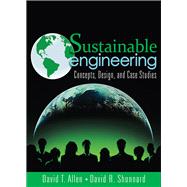
Note: Supplemental materials are not guaranteed with Rental or Used book purchases.
Purchase Benefits
Looking to rent a book? Rent Sustainable Engineering Concepts, Design and Case Studies [ISBN: 9780132756549] for the semester, quarter, and short term or search our site for other textbooks by Allen, David; Shonnard, David R.. Renting a textbook can save you up to 90% from the cost of buying.
Dr. David R. Shonnard is Robbins Professor in the Department of Chemical Engineering at Michigan Technological University and director of the Sustainable Futures Institute. He received a B.S. in chemical/metallurgical engineering from the University of Nevada, Reno, in 1983; an M.S. in chemical engineering from the University of California, Davis, in 1985; a Ph.D. from the University of California, Davis, in 1991; postdoctoral training in bioengineering at the Lawrence Livermore National Laboratory from 1990 to 1993; and he was a visiting instructor at the University of California at Berkeley in 2003. His experiences in life-cycle assessment (LCA) methods and applications include a one-year sabbatical at the Eco-efficiency Analysis Group at BASF AG in Ludwigshafen, Germany. He has been on the faculty in the Department of Chemical Engineering at Michigan Technological University since 1993. Dr. Shonnard has more than twenty years of academic experience in sustainability issues in the chemical industry and Green Engineering. He is coauthor of the textbook Green Engineering: Environmentally Conscious Design of Chemical Processes, published by Prentice Hall in 2002. His current research interests focus on investigations of new forest-based biorefinery processes for production of transportation fuels, such as cellulosic ethanol and pyrolysis-based biofuels, from woody biomass using recombinant DNA and other approaches. Another active research area is LCA of biofuels and other biorefinery products to determine greenhouse gas emissions and net energy balances. He has contributed to National Academy of Sciences publications on green chemistry/engineering/sustainability in the chemical industry. Dr. Shonnard has coauthored 70 peer-reviewed publications and received numerous honors and awards for teaching and research into environmental issues of the chemical industry, including the Ray W. Fahien Award from ASEE (2003). He is a recipient of the NSF/Lucent Technologies Foundation Industrial Ecology Research Fellowship (1998) for research that integrates environmental impact assessment with process design.
Acknowledgments xi
About the Authors xiii
Chapter 1: An Introduction to Sustainability 1
1.1 Introduction 1
1.2 The Magnitude of the Sustainability Challenge 2
1.3 Energy 3
1.4 Materials Use 8
1.5 Environmental Emissions 13
1.6 Summary 27
Problems 28
References 32
Chapter 2: Risk and Life-Cycle Frameworks for Sustainability 35
2.1 Introduction 35
2.2 Risk 35
2.3 Life-Cycle Frameworks 42
2.4 Life-Cycle Assessment Tools 55
2.5 Summary 57
Problems 57
Appendix: Readily Available Hazard References 61
References 62
Chapter 3: Environmental Law and Regulation 65
3.1 Introduction 65
3.2 Nine Prominent Federal Environmental Statutes 68
3.3 Evolution of Regulatory and Voluntary Programs from End-of-Pipe to Pollution Prevention and Sustainability 72
3.4 Pollution Prevention Concepts and Terminology 73
3.5 Environmental Law and Sustainability 74
Problems 75
Appendix 77
References 89
Chapter 4: Green, Sustainable Materials 91
4.1 Introduction 91
4.2 Environmental and Natural Resource Use Footprints of Material Extraction and Refining 91
4.3 Tracking Material Flows in Engineered Systems 99
4.4 Environmental Releases 107
4.5 Summary 114
Problems 114
References 115
Chapter 5: Design for Sustainability: Economic, Environmental, and Social Indicators 117
5.1 Introduction 117
5.2 Sustainable Engineering Design Principles 118
5.3 Economic Performance Indicators 126
5.4 Environmental Performance Indicators 133
5.5 Social Performance Indicators 146
5.6 Summary 149
Problems 149
Appendix 151
References 160
Chapter 6: Case Studies 165
6.1 Introduction 165
6.2 Biofuels for Transportation 166
6.3 Transportation, Logistics, and Supply Chains 181
6.4 Sustainable Built Environments 186
6.5 Additional Case Studies 201
References 201
Index 207
The New copy of this book will include any supplemental materials advertised. Please check the title of the book to determine if it should include any access cards, study guides, lab manuals, CDs, etc.
The Used, Rental and eBook copies of this book are not guaranteed to include any supplemental materials. Typically, only the book itself is included. This is true even if the title states it includes any access cards, study guides, lab manuals, CDs, etc.